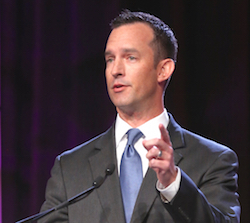
National Center for Assisted Living members will converge on the nation’s capital Monday and Tuesday with four themes in mind for legislators and their staffs, NCAL Executive Director Scott Tittle told McKnight’s Senior Living.
“First, we want to make sure that members of Congress and their staffs truly understand the role that assisted living plays in the continuum of care,” Tittle said. “It’s an educational opportunity to talk to staff and members about what assisted living is and what it’s not.”
Approximately 430 members from all over the country registered to be in Washington for the annual Congressional Briefing, the highest anticipated attendance ever, according to the organization. Even more people may register on-site, NCAL said.
Members of NCAL and the American Health Care Association will hear remarks from Rep. Richard Neal (D-MA), ranking minority member on the House Ways & Means Committee, and from Fox News Channel’s chief political anchor, Bret Baier. And they’ll be meeting with lawmakers from their home districts.
| NCAL stats
According to the National Center for Assisted Living’s recently released annual report for 2016:
|
“We shoot to meet with every office on Capitol Hill, both in the Senate and on the House side,” Tittle said.
As in previous years, keeping assisted living regulation at the state level will be another important talking point, he said.
“We talk about how important assisted living will be in the future to receive this huge baby boom generation,” Tittle said, adding that “states are in the best position to regulate their sector going forward, because they really are the best incubators for the new, innovative models that are going forward in assisted living.”
NCAL members also will stress with legislators and their staffs the role that Medicaid plays in assisted living, he said.
“While a majority of assisted living is still private-pay, a significant component, and likely a growing component, is Medicaid,” Tittle said, noting that approximately 15% of current assisted living residents are Medicaid beneficiaries, but 46% or 47% of assisted living buildings across the country are Medicaid-certified. “So they’re positioned for future growth for seniors with low resources and high acuity,” he said.
NCAL members affected by the home- and community-based services final rule from the Centers for Medicare & Medicaid Services also will be discussing the rule with lawmakers — “about its current state what the rule might mean for their buildings in terms of complying,” Tittle said.
The final rule, issued in January 2014, established new reimbursement criteria for home- and community-based settings with the goal of enabling Medicaid beneficiaries to receive services in settings that are integrated into the community rather than in skilled nursing facilities. Many assisted living communities have provided home- and community-based services to their residents through Medicaid waivers. Under the rule, however, certain settings — including settings located in buildings in which inpatient institutional treatment is provided, settings in buildings on the grounds of or adjacent to a public institution, or settings that isolate individuals from the broader community — are presumed ineligible for the waiver program unless they meet a heightened standard of proof.
“Certainly, we’ve seen some positive messaging coming from this administration” related to the rule, Tittle said, noting a March 14 letter in which Health and Human Services Secretary Tom Price, M.D., and CMS Administrator Seema Verma, M.P.H., indicated that they might delay its compliance deadline, and then CMS’ May 9 announcement of a three-year extension of the deadline, to March 17, 2022.
Lastly, Tittle said, members will invite members of Congress and their staffs to tour assisted living communities when they are in the districts during a recess or a weekend. “There’s no better way to understand what assisted living is about,” he said.



